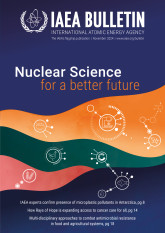
If you would like to learn more about the IAEA’s work, sign up for our weekly updates containing our most important news, multimedia and more.

Climate change and land-use change are combining to alter global hydrological cycles, driving the need to improve water resource management. The IAEA’s Global Water Analysis Laboratory Network (GloWAL Network), launched during the United Nations 2023 Water Conference, makes a direct contribution towards improving water resource management using nuclear techniques.
“GLOWAL aims to assist countries in generating essential information to improve the resilience of water systems to the combined effects of climate and land use change,” says Jodie Miller, Section Head of the Isotope Hydrology Section at the IAEA.
The First Coordination Meeting of the GloWAL Network was held in June 2024 with the goal of identifying areas where the network can accelerate the achievement of Sustainable Development Goal (SDG) 6 (on clean water and sanitation), as global efforts to meet its 2030 targets are off track.
Laboratory services capable of providing reliable data in a timely manner are the cornerstone of any country’s capacity to better understand and manage its water resources and to plan, implement and interrogate actions that support national water governance and resilience of supply.
The GloWAL Network enables collaboration and communication between laboratories across the world to share knowledge, foster capacity building and support training so that every laboratory can reach its full potential.
By enabling independent data generation on water resources in developing countries, the network will help to narrow the technical gaps between developed and developing countries, bringing together financial investment and scientific innovation in water analysis and improving the sustainability of countries’ water resource management.
“Innovative approaches must be accelerated and scaled up for transformative change, utilising technology and customising innovation to local contexts” said Otlogetswe Totolo, Vice Chancellor of the Botswana International University of Science and Technology.
As part of the United Nations Decade of Action to deliver on global goals, UN Water developed the SDG 6 Global Acceleration Framework around five ‘accelerators’: data and information; innovation; capacity development; governance; and finance. The GloWAL Network supports countries with all five of these accelerators.
At the First Coordination Meeting of the GloWAL Network, participants from 54 Member States and United Nations agencies focused their discussions on enhancing four key areas: scientific challenges; data and information; capacity building; and scientific innovation. Based on the conclusions of the meeting, the IAEA developed a strategy and roadmap setting out how the GloWAL Network can accelerate the achievement of SDG 6, starting with an ongoing baseline survey of laboratory capacity in all regions of the world.

